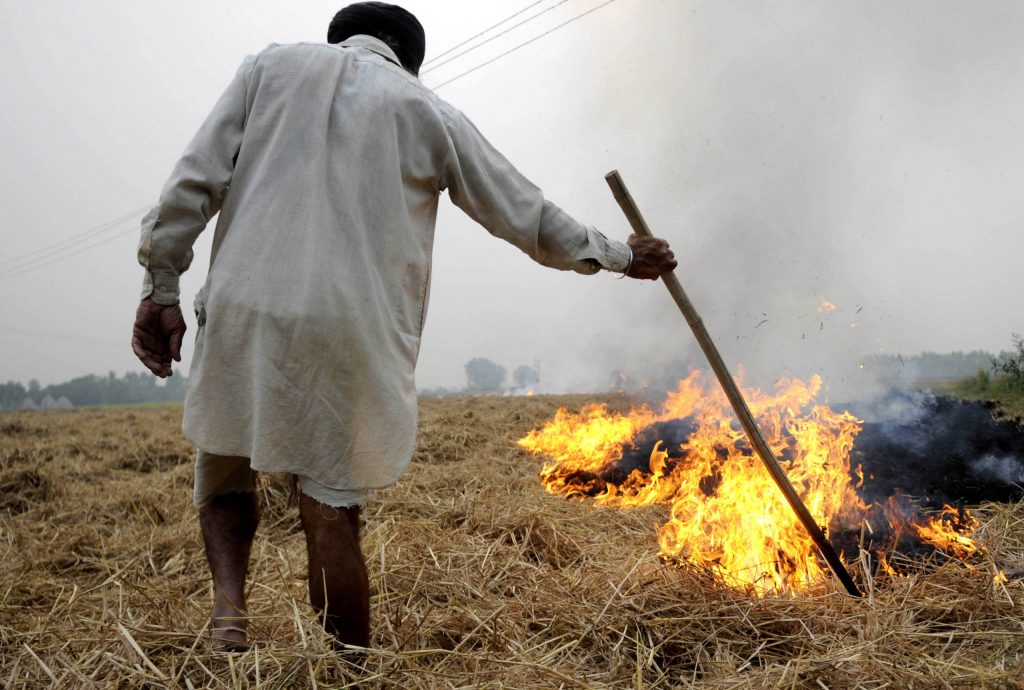
Even as Punjab, Haryana and Delhi spar over the annual incidence of farm fires leading to severe air pollution in the NCR, the Apex Court has reprimanded the squabbling states and ordered them to get their act together and put an end to the menace. A report by Rajesh Moudgil
Burning of the paddy straw after every harvest season in Punjab, Haryana and a few other states leading to severe air pollution in Delhi and the national capital region (NCR) seemed to be a business as usual until November 7 when the Supreme Court took on them telling them sternly to put an end to the practice of stubble burning as it was their job.
While the Delhi-NCR choked and continued to be a virtual gas chamber due to smog primarily caused by the farm fires in the adjoining states, the top court told the governments of Punjab, Haryana, Rajasthan, Uttar Pradesh and Delhi to take immediate steps to stop the incidence of stubble burning – one of the main contributors for the severe air pollution in the region.
Here is what it held: The SC Bench led by Justice Sanjay Kishan Kaul made the local station house officer (SHO) under the supervision of the director general of police (DGP) and the chief secretary (CS) of the respective state responsible for ensuring that stubble burning was stopped. The bench asked them to work on it, right away.
It said that it wanted it (stubble burning) stopped, did not know how the states do it ….. it was their job and it should be done immediately.
“We do not care how you do it… it must stop. Whether by forceful actions and sometimes by incentives, you have to stop the fire. Your administration must do so,” it said and added that the residents of Delhi were grappling with health problems year after year as the issue had not been resolved.
The Bench said there could not be a political battle every time…. Delhi could not be made to go through this year after year.
Notably, Delhi and Punjab have the Aam Aadmi Party (AAP) governments, Haryana has BJP-Jannayak Janta Party (JJP)-combine government.
Delhi measures “all optics”
The apex court also questioned the effectiveness of the Delhi government’s odd-even car rationing scheme so as to check the vehicular pollution in the national capital, terming it as “all optics’’. The Supreme Court asked the Delhi government to ensure that the municipal solid waste was not burnt in the open. When the amicus curiae Aparajita Singh said that the smog towers installed by the Delhi government were not working, Justice Kaul termed it “ludicrous’’ and asked the Delhi government to have them repaired immediately.
Also, the top court during the next hearing in the case on November 10, held that the police cases against farmers were not a solution to stubble burning and suggested that the governments should consider withholding minimum support price (MSP) to the offenders of farm fires for a year besides exhorting farmers to give up stubble burning.
“You will register FIRs, then withdraw. Registering FIR is not the solution actually. It has to be incentive-based or even punitive measures. Like, just thinking out loud, some who burn stubble will not be given MSP next year. Carrot and stick is up to you. Farm fires must stop. Cannot be lackadaisical,’’, the Bench said seeking the chief secretaries of the states to find a solution. The Court, however, clarified that it was not advocating for a total removal of MSP on paddy. However, it also opined that farmers were a part of the society and they had to be responsible.
The next hearing in the case is on November 21.
Cabinet Secy pulls up Punjab
Subsequent to the top court’s November 7 reprimand, the Cabinet Secretary, Rajiv Gauba pulled up the Punjab government asking them to check the farm fires and fix responsibility of civil and police administration.
The cabinet secretary also asked the commission on air quality management (CAQM) to send its flying squads to Punjab and Haryana and submit reports on a daily basis. He held that immediate steps were needed to check the incidence of the farm fires as about 90% paddy harvest was complete in Punjab and 60% in Haryana.
The agriculture minister said that over Rs 3,300 crore had been released under the crop residue management (CRM) scheme so far, of which over Rs 1,500 crore was released to Punjab and about Rs 1,000 crore to Haryana.
According to media reports, more than 22,600 cases of stubble burning were recorded between September 15 and November 7, of which about 21,000 were said to be in Punjab and the rest – about 1,600 in Haryana, as per the data provided by the commission on air quality management (CAQM).
The SC Fiat Impact
On November 9, Punjab launched a crackdown against the offenders of the farm fires; police held over 1,300 meetings with village heads; formed over 630 flying squads; over 245 police cases were registered; fines worth over Rs 88 lakh imposed on over 3,800 farmers.
On November 8, over 2,000 farm fires were recorded in Punjab – highest in a day so far.
However, the police action was not taken well by the farmers who claimed there was a severe shortage of machines to manage stubble.
The farm leaders held that while the famers did not want to burn the stubble either, they had no choice but to do it with there being no other option. They say that while about five lakh farmers had applied for the crop residue management machines available for subsidised rates, only about 25,000 could get them till a few days ago.
Pertinently, the farmers opt to burn the paddy straw to clear off their fields as they find a very short period between paddy harvesting and sowing of the next crop – wheat. Another reason for the farmers to opt this practice is that unlike the straw management course, burning paddy straw does not cost them anything, hence the quick and cheapest way to get rid of it.













